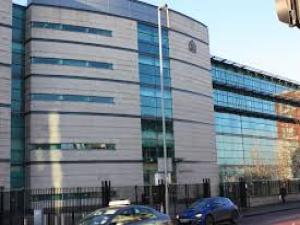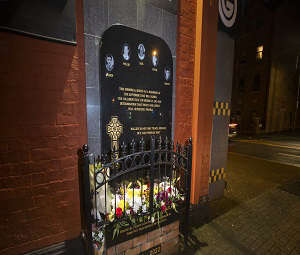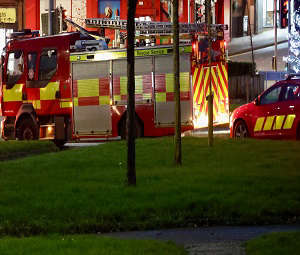
Q Radio News
A brother of alleged UDA leader David Coleman was in court today (Saturday) accused of having cocaine with intent to supply.
Despite police objections at Belfast Magistrates Court that 24-year-old Gary Coleman has allegedly “stepped up and assumed some sort of leadership role in in this organised crime gang,” the north Belfast father-of-three was granted bail but will not be freed until he finds an acceptable address outside of the city.
Coleman, from Hopewell Crescent, spoke only to confirm that he understood the single charge against him alleging that on 14 December this year, he possessed class A cocaine with intent to supply.
Giving evidence to the court Detective sergeant Sweeney said he believed he could connect Coleman to the offence and that police objected to him being freed on bail.
The court heard the charge arises after police uncovered 19 separate one gram bags of cocaine in a bin at Coleman’s address, described by his defence solicitor as “an address that has been searched continually.”
Outlining how David ‘Dee’ Coleman was remanded into custody accused of membership of the UDA last October, the DS revealed the PSNI have been “investigating this crime gang for over a year” and claimed Gary Coleman was a member of said gang.
Indeed the detective further claimed that “David Coleman had a leadership role in C Coy and that’s been accepted as a Prima Facie case by the court” and that since his brother went into custody, “Gary Coleman has stepped up and assumed some sort of leadership role in this organised crime gang.”
He also revealed that when Dee Coleman was arrested in October, Gary Coleman was arrested at the same time and was reported to the PPS over an allegation that he was also a member of the proscribed organisation.
DS Sweeney told the court that while police don’t believe the gang “are not directly involved in the importation of kilos of cocaine,” he testified that their modus operandi is to “bring relatively small amounts on a regular basis” and claimed Gary Coleman was dealing from his home on Hopewell Crescent.
He outlined that when he was arrested in October, Gary Coleman had £1,000 in cash and when he attended voluntarily on Friday, he had £300 cash in his possession, all of which has been seized under the proceeds of crime act.
“We believe that because of the money that’s being made, Gary Coleman will continue as part of this organised crime gang, to continue to deal drugs,” said the cop adding that despite the year long police operation resulting in “significant charges and seizures....this has not deterred the crime gang from engaging in drug dealing criminality.”
DS Sweeney said another ground for objecting to bail was that Gary Coleman could interfere with the investigation as police are conducting enquiries into what mobile phones he had and what they were used for.
While two SIM cards were uncovered hidden in a “modified baked beans tin” at a different address linked to Gary Coleman, “during interview he refused to provide the location of his phone” so police fear that if freed, he could dispose of that potential piece of evidence.
Under cross examination, Coleman’s defence solicitor was highly critical of the police handling over the issue of bail, revealing that while a custody sergeant at Musgrave Street station ordered him to be freed last night, the issue was referred to a Superintendant “and that resulted, in effect in the sergeant being bounced” and the decision reversed.
He submitted that such handling in the case by the PSNI “is in direct violation” of an accused persons rights but added that “we welcome the fact that there is a judicial ire of the case.”
The lawyer suggested and the officer agreed that during questioning, Coleman had “given an account” for the cash he had and had made admissions over the drugs, claiming he bought them “on strap” for £250 and they were for his own personal use.
DS Sweeney told the court however that police believe the drugs are worth “over £1,000” and that Gary Coleman’s only legitimate income is “through benefits.”
While the officer also conceded Hopewell Crescent had been Gary Coleman’s registered address with the Housing Executive, he maintained that police believed his brother had lived there prior to his arrest and that Gary only started using it after his brother was remanded.
The lawyer said he “would struggle to find a more searched address in the Shankill” and the DS accepted it probably was but added that “every time we search it we find something inherently illegal.”
He submitted that any order for Coleman to find an address outside the city would be tantamount to a bail refusal, DS Sweeney argued that if he was allowed to live there, “he will continue uninterrupted the activities that he has been engaged in.”
“If he is removed from Belfast that removes him from the whole distribution and supply network and safeguards the citizens of the Shankill community,” said the officer.
Granting bail, District Judge Harry McKibbin said “he will have to live outside Belfast, I’m sorry, it’s as simple as that.”
In addition to singing his own bail of £1,000 and his father a £500 surety, the Judge banned Coleman from owning or using any mobile phone or “electronic communication device,” ordered him to report Daily to police and to keep a curfew from 9pm to 6am.
Coleman is due back before the court on 21 December.


 Officer to be prosecuted for offence linked to Troubles memorial during pandemic
Officer to be prosecuted for offence linked to Troubles memorial during pandemic
 Pair appear before court charged with nurse’s murder
Pair appear before court charged with nurse’s murder
 Woman dies in West Belfast house fire
Woman dies in West Belfast house fire
 Eleanor Donaldson’s bid to have two charges withdrawn ‘should not delay trial’
Eleanor Donaldson’s bid to have two charges withdrawn ‘should not delay trial’
 Police surveillance operation to unmask journalistic source ruled unlawful
Police surveillance operation to unmask journalistic source ruled unlawful